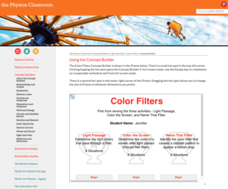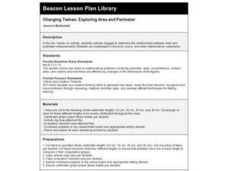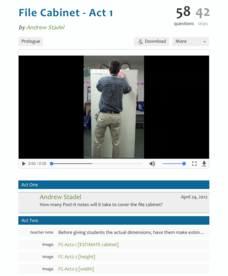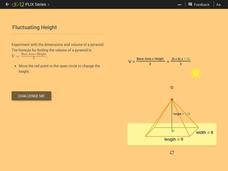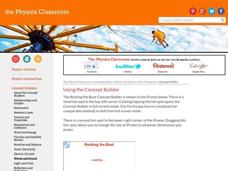Curated OER
Lesson 4 Activity 1: Mapping the Third Dimension
Learners work in pairs to construct a simple stereoscope.
Curated OER
How Big Is That Star?
Aspiring astronomers study stars. They compare stars and explain the relationship between radius, mass, and diameter. By creating a star simulation, they discover how a binary star system's orbit can cause changes in the observed...
Physics Classroom
Light Intensity
Light intensity varies by the strength of the light bulb as well as the distance to the light bulb. Pupils apply these concepts independently at first. They must solve for the light intensity as either the distance or the wattage of the...
Physics Classroom
Color Filters
Filters provide amusing changes to images in applications other than just Instagram! High school pupils apply their knowledge of colored filters to three different interactive sets of puzzles. They identify light colors that pass through...
Physics Classroom
The L.O.S.T. Art of Image Description - Curved Mirrors
We see curved mirrors every day in spoons, rear-view mirrors, stores as a safety measure, make-up mirrors, and in novelty stores. Scholars explore the changes to an image based on the curve of the mirror, the location of the image, and...
Curated OER
Two for One Box Company: Student Worksheet
Fifth and sixth graders work alone or in pairs to determine the volume of paper boxes of various dimensions. Pupils write ratios of dimensions and volumes.
Curated OER
Two for One Box Company
Eighth graders experiment to decide if a box that is twice as big holds twice a much. They work the concept of volume and how changing dimensions affect it.
EngageNY
Computing Actual Lengths from a Scale Drawing
The original drawing is eight units — how big is the scale drawing? Classmates determine the scale percent between a scale drawing and an object to calculate the length of a portion of the object. They use the percent equation to find...
CK-12 Foundation
Pythagorean Theorem to Determine Distance: Distance Between Friends
Pupils use an interactive to help visualize the right triangles needed to calculate distances between friends' houses. Individuals solve five problems on how to determine distances and comparing the distances.
Curated OER
Changing Twines: Exploring Area and Perimeter
Third graders review formulas for area and perimeter in quadrilaterals. They arrange pre-cut twine on a centimeter graph paper to create non-congruent quadrilaterals. They calculate the perimeter and area of each form.
Teach Engineering
Statistical Analysis of Flexible Circuits
Scholars connect statistical analysis with flexible electric circuits. They first learn about flexible circuits and their applications through a PowerPoint presentation and then consider how the fabrication process for these circuits...
101 Questions
File Cabinet
Take the resource out of the file cabinet. Young mathematicians estimate the number of sticky notes it would take to cover the surface area of a file cabinet. They answer a set of questions on how the number of sticky notes would change...
Curated OER
How Big is Barbie?
Young scholars measure various dimensions of a male and a female dolls body and scale them proportionally to average human measurements. They calculate the appropriate scale factor (magnitude) to enlarge their doll and apply that scale...
Curated OER
Maximize area
For this subscription-based activity, algebra learners model changes in the length and width of a rectangle to determine the maximum area possible for a given perimeter and solve several application problems involving area, included in...
CK-12 Foundation
Using Quadratic Equations to Solve Problems: Construct a Soccer Field
Build a soccer field through a little mathematical analysis. Individuals manipulate the dimensions of a soccer field as they drag points to new positions. The simulation shows the corresponding intercepts and area. As pupils explore the...
Star Date
Shadow Play
Three activities make up a solar system lesson that features the sun, its light, and the shadows it produces. Scholars step outside to discover the changes shadows make at different times of day, take part in a demonstration of how Earth...
Balanced Assessment
Square in Square
Challenge the class to devise a method to determine the dimensions of a rectangle inscribed in another rectangle. Pupils make connections between functions and geometry as they examine the area and perimeter of a square or rectangle...
CK-12 Foundation
Volume of Pyramids: Fluctuating Height
The height of a pyramid may change, but the usefulness of the interactive will not. Learners drag the apex of a pyramid to change its height. They then answer a set of challenge questions designed to investigate how changing the...
Curated OER
Super Size It, Please!
Pupils take photos from a given distance and determine the height of the person using a scale factor. Pupils calculate the ratio of student actual height to student photo height. They take pictures from 3 different distances to see if...
National Nanotechnology Infrastructure Network
Synthesis and Characterization of CdSe Quantum Dots
Does the size of a sample change the physical properties of that substance? It turns out it can! Young scientists combine physics and chemistry to synthesize CdSe quantum dots and record their color properties. Learners should notice a...
Physics Classroom
Waves - Case Studies
What can your class tell about a wave just by looking at it? Using a simulation, physics pupils work through a series of case studies to determine the effects of speed, frequency, and density on waves. Part of a larger playlist on waves...
LABScI
Conservation of Momentum: Marble Collisions
What happens to the momentum of an object when it strikes another object? Scholars roll a marble down a ramp so it collides with another marble. By measuring the speed of each marble before and after the collision, pupils answer this...
CK-12 Foundation
Properties of a Normal Distribution: Uniform Distributions
There's nothing normal about an extraordinary resource. Scholars change the dimensions of a normal distribution using a slider interactive. Determining the area under the graph gives probabilities for different situations.
Physics Classroom
Rocking the Boat
Sometimes it's okay to rock the boat! Science scholars manipulate wave properties using a fun interactive. Part of a larger playlist that dives into waves and sound, the lesson helps users work their way from apprentice to wizard by...
Other popular searches
- Changing Dimensions Area
- Changing Dimensions Volume
- Changing Dimensions Math
- Changing Dimensions Prisms
- Changing Dimensions 3 D





